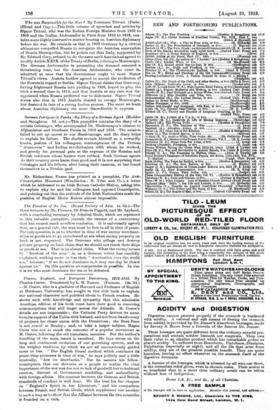France, England, and European Democracy, 1216-1915. By Charles Cestre. Translated
by L. Si. Turner. (Putnam. 128. 6d.) —M. Cestre, who is a graduate of Harvard and Professor of English at Bordeaux University, has sought in this able book to explain our national character and political ideals to French readers. He shows such Wide knowledge and sympathy that this admirable American edition of his book must have done good in removing misconceptions that still linger across the Atlantic. N. Ceetre's detaila are not impeccable ; the Unionist Party derives its name from its support of the Union with Ireland, and not from its advocacy of projects for closer union with the Dorninions ; the Boat-Race is not rowed at Henley ; and, to take a larger subject, Magna Carta was not so muoh the outcome of a popular movement as M. Castro, following the old historians, assumes. But the author's handling of the main issues is excellent. He lays stress on the long and continuous evolution of our governing system, and on the weighty tradition by which we are all unconsciously guided more or less. "The English liberal method which continues its peacie-time processes in time of war," he says politely and a little ironically, "has its drawbacks." But he assures his fellow. countrymen that our slowness as a people to realize the vital importance of the war was due not to lack of goodwill but to habitual caution, distrust of Government muddling, and unfamiliarity with foreign affairs. His contrast between the German and British standards of conduct is well done. We like best his fine chapter on "England's Spirit in her Literature," and his comparison between French and British ideals, which supplement one another in such a way as to show that the Alliance between the two countries is founded on a rock.


































 Previous page
Previous page